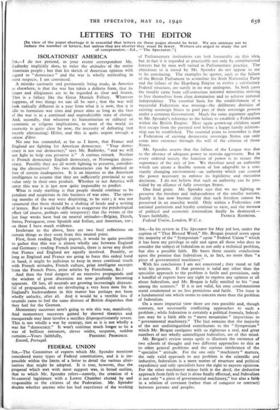FEDERAL UNION SI11, — The Committee of experts which Mr. Spender mentions
considered many types of Federal constitutions, and it is im- possible within the limits of a letter to detail the various alter- natives that might be adopted. It is true, however, that the proposal which met with most support was, in broad outline, that to which Mr. Spender refers—namely, the creation of a bi-cameral legislature with a Lower Chamber elected by and responsible to the citizens of the Federation. Mr. Spender doubts whether anyone who has had experience of the working
of Parliamentary institutions can look favourably on this ideal but in fact it is regarded as practicable not only by constitutional lawyers but by men well versed in Parliamentary practice. The objections to it raised by Mr. Spender do not appear to me to be convincing. The examples he quotes, such as the failure of the British Parliament to assimilate the Irish Nationalist Party and the failure of the Hapsburg Empire to evolve a satisfactory Federal structure, are surely in no way analogous. In both cases the trouble came from self-conscious national minorities striving to free themselves from alien domination and to achieve national independence. The essential basis for the establishment of a successful Federation was missing—the deliberate decision of existing sovereign States to pool part of their sovereign powers under a common Government. Much the same argument applies to Mr. Spender's reference to the failure to establish a Federation within the British Empire. Here again grown-up children must first escape from the parental roof before a happy family relation- ship can be established. The essential point to remember is that a Federation of existing democratic sovereign States can only come into existence through the will of the citizens of those States.
Mr. Spender asserts that the failure of the League was due to the absence of adequate power to restrain aggression. But in every ordered society the function of power is to secure the supremacy of the rule of law. We therefore need an authority which can create a flexible system of law adaptable to a con- stantly changing environment—an authority which can control the power necessary to enforce its legislative and executive decisions. I do not believe that such an authority can be pro- vided by an alliance of fully sovereign States.
One final point. Mr. Spender says that we are fighting to preserve the freedom and independence of the smaller nations. Surely it has now become clear that such freedom cannot be preserved in an anarchic world. Only within a Federation can national patriotism and loyalty continue to exist, and the menace of political and economic nationalism finally be destroyed.— Yours faithfully, PATRICK RANSOM& Federal Union, London, W.C. 1.






























 Previous page
Previous page